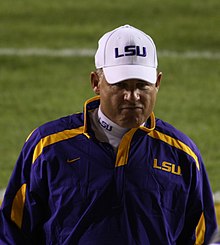
Houston Dale Nutt Jr. is a former American football player and coach. He formerly worked for CBS Sports as a college football studio analyst. Previously, he served as the head football coach at Murray State University (1993–1996), Boise State University (1997), the University of Arkansas (1998–2007), and the University of Mississippi (2008–2011). Nutt's all-time career winning percentage is just under 59 percent.
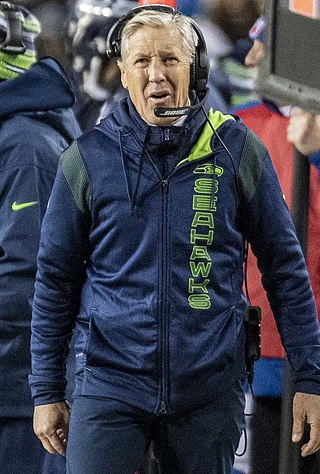
Peter Clay Carroll is an American football executive and former coach who is an advisor and executive vice president for the Seattle Seahawks of the National Football League (NFL). He was previously the head football coach at the University of Southern California (USC) from 2001 to 2009 and the head coach of the Seahawks from 2010 to 2023. Carroll is the fourth and most recent head coach to win a college football national championship and an NFL championship.

John Vincent Calipari is an American basketball coach. Since 2009, he has been the head coach of the University of Kentucky men's team, with whom he won the NCAA Championship in 2012. He has been named Naismith College Coach of the Year three times, and was inducted into the Basketball Hall of Fame in 2015.

The USC Trojans football program represents University of Southern California in the sport of American football. The Trojans compete in the Football Bowl Subdivision (FBS) of the National Collegiate Athletic Association (NCAA) and the Big 10 Conference.

Lane Monte Kiffin is an American football coach who is the head coach of the Ole Miss Rebels. Kiffin was the offensive coordinator for the USC Trojans football team from 2005 to 2006, head coach of the National Football League's Oakland Raiders from 2007 to 2008, head coach of the University of Tennessee Volunteers college football team in 2009, and head coach of the Trojans from 2010 to 2013. He was the youngest head coach in modern NFL history at the time when he joined the Raiders, and, for a time, was the youngest head coach of a BCS Conference team in college football. Kiffin was the offensive coordinator at the University of Alabama from 2014 until 2016, when he was hired to be the head coach at Florida Atlantic, a position he held until December 2019, when he became the head coach at Ole Miss.
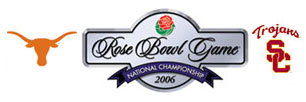
The 2006 Rose Bowl Game, played on January 4, 2006, at the Rose Bowl in Pasadena, California, was an American college football bowl game that served as the BCS National Championship Game for the 2005 NCAA Division I-A football season. It featured the only two unbeaten teams of the season: the defending Rose Bowl champion and reigning Big 12 Conference champion Texas Longhorns played Pacific-10 Conference titleholders and two-time defending AP national champions, the USC Trojans. Texas would defeat USC 41–38 to capture its fourth football championship in program history and first consensus national title since 1969. The game was a back-and-forth contest; Texas's victory was not secured until the game's final nineteen seconds. Vince Young, the Texas quarterback, and Michael Huff, a Texas safety, were named the offensive and defensive Rose Bowl Players of the Game. ESPN named Young's fourth-down, game-winning touchdown run the fifth-highest rated play in college football history. The game is the highest-rated BCS game in TV history with 21.7% of households watching it, and is often considered the greatest Rose Bowl game of all time, as well as the greatest college football game ever played.
The 2005 USC Trojans football team represented the University of Southern California in the 2005 NCAA Division I-A football season, winning the Pacific-10 Conference (Pac-10), and playing for the NCAA Division I-A national championship. The team was coached by Pete Carroll, led on offense by quarterback and 2004 Heisman Trophy winner Matt Leinart, and played their home games in the Los Angeles Coliseum.

The UCLA–USC rivalry is the American collegiate athletics rivalry between the UCLA Bruins sports teams of the University of California, Los Angeles (UCLA) and USC Trojans teams of the University of Southern California (USC).

The 2005 Orange Bowl was the BCS National Championship Game of the 2004 NCAA Division I-A football season and was played on January 4, 2005, at Pro Player Stadium in Miami Gardens, Florida. The game matched the USC Trojans against the Oklahoma Sooners. Both teams entered with undefeated, 12–0 records. Despite only being a 1-point favorite, USC defeated Oklahoma by a score of 55–19, led by quarterback Matt Leinart. ESPN named Leinart's performance as one of the top-10 performances in the first ten years of the BCS system.
The 2004 USC Trojans football team represented the University of Southern California in the 2004 NCAA Division I-A football season. The 2004 Trojans football team won the 2004 BCS National Championship by winning the 2005 Orange Bowl, that year's BCS National Championship Game. The team also won the AP title for the second year in a row. It was the Trojans' first unanimous national championship since 1972, and the second time a team had gone wire-to-wire, with the Trojans holding the number 1 spot in the polls all season. The team was coached by Pete Carroll in his fourth year with the Trojans, and played their home games in the Los Angeles Memorial Coliseum. The team is widely considered one of the greatest college football teams of all time.
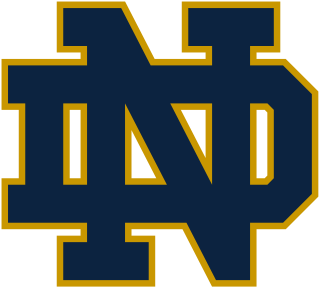
The Notre Dame–USC football rivalry is an American college football rivalry between the Notre Dame Fighting Irish football team of the University of Notre Dame and USC Trojans football team of the University of Southern California, customarily played on the Saturday following Thanksgiving Day when the game is in Los Angeles or on the second or third Saturday of October when the game is in South Bend, Indiana.
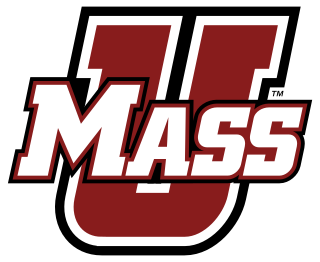
The UMass Minutemen football team represents the University of Massachusetts in the NCAA Division I Football Bowl Subdivision (FBS). The Minutemen compete as an FBS independent. Since 1965, their home games have been played at Warren McGuirk Alumni Stadium on the university's campus in Hadley, Massachusetts.
In the University of Southern California athletics scandal, the University of Southern California (USC) was investigated and punished for NCAA rules violations in the Trojan football, men's basketball and women's tennis programs.

The Notre Dame–Stanford football rivalry is an American college football rivalry between the Notre Dame Fighting Irish football team of the University of Notre Dame and Stanford Cardinal football team of Stanford University. As of 2023, the Notre Dame Fighting Irish and Stanford Cardinal have met 37 times, beginning in 1925. The Notre Dame–Stanford game has been played annually since 1997, with the teams meeting at Notre Dame Stadium earlier in the season in even-numbered years, and at Stanford Stadium on the weekend following Thanksgiving in odd-numbered years since 1999. The game typically alternates positions in Notre Dame's schedule with its other Pac-12 opponent, USC.
In various sports, a forfeit is a method in which a match automatically ends, and the forfeiting team loses.

South Carolina Gamecocks football under Steve Spurrier covers the history of the South Carolina Gamecocks football program under Steve Spurrier from 2005 to 2015.
